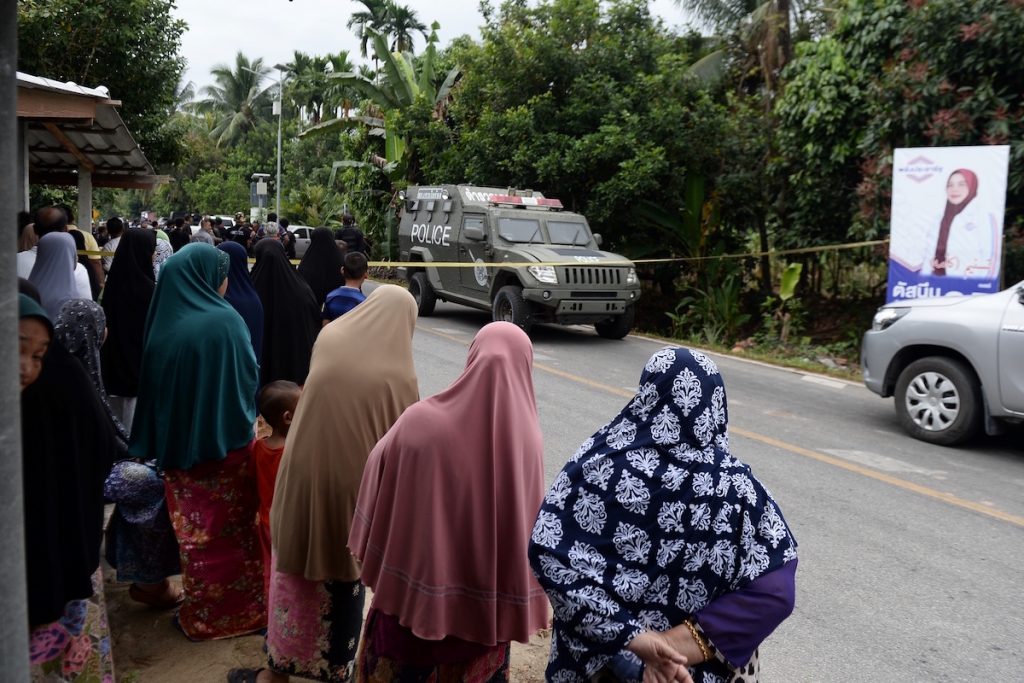In Thailand’s three most southern provinces thousands of people have lived in fear; enduring a long-running conflict waged between armed insurgents and the Thai military.
But on April 3 something unexpected occurred. The largest and most active of the armed independence movements, the Barisan Revolusi Nasional Malyu Patani (BRN), publicly announced to “cease all” of its activities.
The insurgents said they have declared a ceasefire in response to the new coronavirus outbreak.
“In order to create a safer and more suitable environment for the people of Patani, for health care agencies and other organizations tasked with preventing and containing the outbreak of coronavirus, BRN is now taking measures to cease all activities for the purposes of providing humanitarian access bearing in mind that the principal enemy of the human race right now is COVID-19,” BRN said in its statement.
Human rights activists and experts have welcomed BRN’s announcement and say it’s the first — though unilateral — ceasefire this conflict has seen in years.
Seeking independence from the Buddhist majority rule, the Muslim BRN has been active for decades in southern Thailand.
Matthew Wheeler, a Bangkok-based senior analyst with the International Crisis Group, said BRN’s move is “entirely unprecedented in this conflict.”
Wheeler, who has monitored the insurgency in the Muslim majority south for years, said that the insurgents have called for a ceasefire before, but those ceasefires were always limited to a number of days.
“The recent statement is different, not least because it was announced publicly on humanitarian grounds, and it is open ended,” he said.
While an insurgency began sometime after World War II it simmered during 1980s and 1990s but re-ignited in 2004 when a demonstration in Tai Bak led to the deaths of 78 people who were suffocated after being stacked in military vehicles by Thai security officers.
Since then over 7,000 people have died in the conflict.
Insurgents have used bomb attacks, ambushes and shootings as tactics. Just a month ago two bombs exploded in front of a government office in Yala province, wounding 18 people. No-one claimed responsibility for the attack, but there’s little doubt the bombs were the work of insurgents.

The Thai military has often responded to attacks with violent raids, house-searches, arrests and shootings. Human rights organizations have repeatedly accused the Thai security forces of torture, killings and enforced disappearances.
Since 2014 the BRN had publicly refused to be involved in any peace-talk initiatives, saying they could only happen occur if an international mediator was included, something the Thai government wouldn’t agree upon. But in late January, the BRN and the Thai government met for peace talks in Kuala Lumpur, Reuters reported.
Negotiations were set to be resumed in March but were postponed because of COVID-19.
“A ceasefire of some kind was certainly going to be on the dialogue agenda at some point, but the pandemic has imposed an indefinite pause on talks,” Wheeler said. “BRN’s ‘cessation of activities’ is a welcome development under these circumstances.”
Sunai Phasuk, a senior researcher for Human Rights Watch (HRW) in Thailand, is cautiously optimistic about recent developments.
“This is a welcoming step after years of hard conflict,” he told LiCAS.news. “It certainly shows goodwill from the BRN side. Now they should work together with the Thai government for the wellbeing of the population.”
So far, the Thai government has been quiet on the insurgent’s announcement and observers have said there haven’t been major operations in the deep south since April 3, although house-searches have continued.
ICG analyst Wheeler said nobody should expect a dramatic change in the way the security forces operate.
“I would think the authorities would wish to encourage and prolong the ceasefire. That said, there are, no doubt, elements within the military that wish to press whatever advantage they believe they possess at the moment,” Wheeler said.
Any military attack could change the situation quickly, as BRN have made it clear that it will only hold onto the ceasefire if the Thai security forces don’t attack them.
What will happen after COVID-19 remains an open question. HRW’s Sunai Phasuk is unsure about the region’s prospects, given the amount of blood spilt over the past 16 years.
“Now we have an opportunity for the Thai government and the rebels to work together,” he said.
“But if the outbreak is over, what will happen? Will they then return to violence, or will they come to their senses and stop it?”





